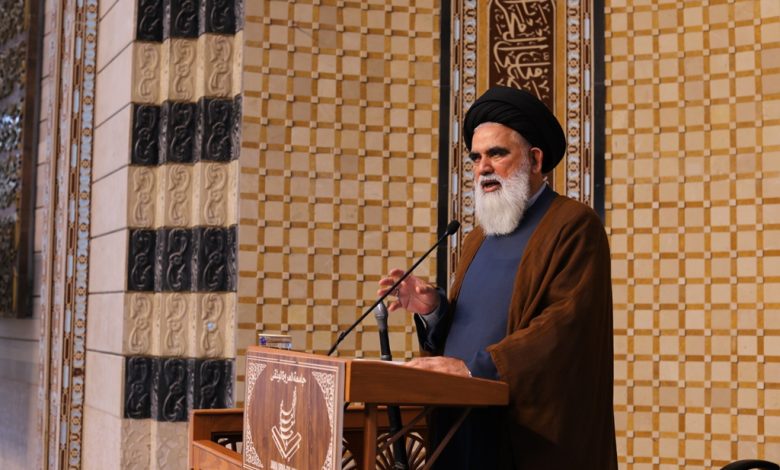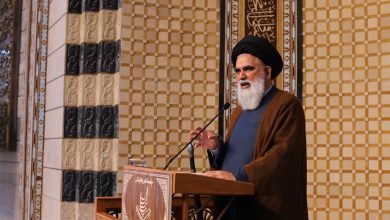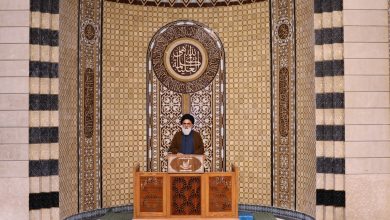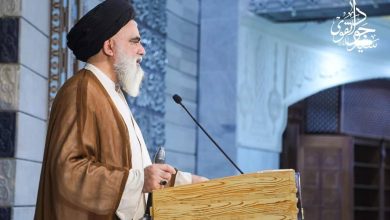
Hujjatul Islam Ustad Syed Jawad Naqvi
(Principal Jamia Orwatul Wuthqa – Lahore)
Delivered at: Masjid Baitul ul Ateeq
Lahore – Pakistan
Friday Sermon 25th April – 2025
Sermon 1 : How to protect yourself from social Fitnah as per Ali (a.s)
Sermon 2: Without Raghbat towards system of Imamat, you are not Shia of Imam Sadiq (a)
Allah has guided us to protect from Fitnah in Surah Al Anfal verse 25
يَا أَيُّهَا الَّذِينَ آمَنُوا اسْتَجِيبُوا لِلَّهِ وَلِلرَّسُولِ إِذَا دَعَاكُمْ لِمَا يُحْيِيكُمْ ۖ وَاعْلَمُوا أَنَّ اللَّهَ يَحُولُ بَيْنَ الْمَرْءِ وَقَلْبِهِ وَأَنَّهُ إِلَيْهِ تُحْشَرُونَ {24}
O you who believe! answer (the call of) Allah and His Messenger when he calls you to that which gives you life; and know that Allah intervenes between man and his heart, and that to Him you shall be gathered.
وَاتَّقُوا فِتْنَةً لَا تُصِيبَنَّ الَّذِينَ ظَلَمُوا مِنْكُمْ خَاصَّةً ۖ وَاعْلَمُوا أَنَّ اللَّهَ شَدِيدُ الْعِقَابِ {25}
And fear an affliction which may not smite those of you in particular who are unjust; and know that Allah is severe in requiting (evil).
We are instructed to protect ourselves from seditions (Fitnah), which do not affect only the oppressors but also victimize the oppressed. Amirul Momineen (a.s) has provided guidance to believers regarding these Fitnah’s and has also shown us the means of protection from them. His guidance is particularly significant because he lived during a time of great Fitnah and had firsthand experience with it. He taught us how seditions originate, how they are nurtured, and how they grow into forces of destruction. Many sermons and sayings of Amirul Momineen (a) are available in Nahjul Balagha and other collections.
In Sermon 149, he (a) states that once Fitnah’s bring about destruction, the resulting consequences become uncontrollable, leaving people unable to shield themselves. He (a) explains that when Fitnah’s arise, even those with firm and resolute hearts can falter, and many prominent personalities can be misled. When Fitnah’s begin to spread, they disrupt faith and belief, causing people to fall prey to doubt and suspicion. Those who even glance into Fitnah are crushed, and those who participate in nurturing it are uprooted by it. The condition of people under the influence of Fitnah resembles that of donkeys under heavy burdens who bite each other, symbolizing mutual blame, accusations, and character assassinations—instead of confronting the real enemies who initiated the Fitnah.
This phenomenon is evident both globally and locally in our present time. Fitnah unravels the bonds of unity that once strengthened the Ummah, plunging truths into obscurity and causing people to lose their sense of direction. The fountains of wisdom dry up, and in their place, foolishness begins to flow. The tyrants and oppressors become the spokespersons, as we see today, where social media has become a platform for the corrupt, ignorant, and foolish—rather than scholars—to influence public opinion on both local and international matters. People begin to perceive their ignorance as wisdom and eagerly spread it.
When Fitnahs rise, even the Bedouins fall under their influence. This indicates that seditions do not confine themselves to the urban and educated populations, but extend to those in remote areas who are far from centers of guidance and often unaware. These Fitnahs strike the Bedouins with such force that they are shattered—social structures are destroyed beyond repair, and even those who seem securely mounted are brought down.
When Fitnah enters a town, it brings bitterness and no glad tidings. Allah has established divine customs (Sunan-e-Ilahi) that govern the universe, wherein every event has an associated cause and effect. Man is given the freedom to choose among these, but when Fitnah emerges, it compels individuals to adopt paths that lead only to destruction. When sedition spreads, even those who should be nurturing, like cows giving milk, produce blood and pus instead. This means that sources of goodness become corrupted.
In peaceful times, scholars used to guide and counsel the people. Past scholars fulfilled their duty of giving admonitions and engaging in Amr Bil Maroof and Nahy Anil Munkar, unlike many contemporary scholars who are instead occupied with sectarianism or materialistic pursuits. The status of the Ulama is not simply due to their knowledge but due to the impact of that knowledge—wisdom, guidance, and protecting people from evil—analogous to the purity of milk. Yet, Ali (a) laments that in times of Fitnah, what is delivered instead is blood and pus.
Fitnah also destroys sources of guidance, like lighthouses—structures built on high places to emit light visible from afar, guiding travelers and sailors. Personalities or places that offer such guidance in their times serve as these lighthouses and minarets. The Fitnah’s of every age have targeted the Ahlulbayt (a) first, thereby extinguishing the light and collapsing the minarets of religion.
Fitnah unravels the knots of certainty, plunging people into doubt about their religion, the Prophets, and their trust in Allah. When these Fitnah’s rage like storms, those of intellect and insight flee from confrontation and seek only to secure themselves. They stop resisting, hoping merely to find safety, and thereby abandon the field to the immoral and corrupt. Fitnah advances forcefully to dominate people. During such chaos, even the Arabs must lift their robes to run, exposing their ankles as they flee—illustrating how people escape Fitnah in haste and desperation. Yet even those who avoid Fitnah cannot escape its influence, and those caught within are often destroyed.
Among those trapped in Fitnah, some are killed without anyone knowing who killed them. Afterward, the people are divided between the slain and those who survive by fleeing in fear, seeking refuge. In this search for safety, many fall into the hands of those who do more harm than the Fitnah itself, deceiving them under the guise of faith.
How many remain truly pious (Muttaqee) during Fitnah? Ali (a) advises us not to become flagbearers of Fitnah. In times of crisis, certain groups exploit the turmoil to achieve their goals and profit from it. As a Persian proverb says, “A fisherman muddies the water to catch fish,” since fish cannot see the net in murky water. The deeper the crisis, the greater the benefits for such opportunists.
This is evident in American politics, which thrives on initiating wars and crises around the world to boost trade. In contrast, China seeks global peace to maintain open trade routes for its products. Today, on his very first day, the American president contacted Modi and Bin Salman to secure multi-billion dollar arms deals—arms that will only be purchased if there is war. And if there isn’t one, leaders like Trump may start one. For some, business and prosperity are rooted in Fitnah, so they become its advocates, its symbols, and spreaders of innovation (Bid’ah).
To protect yourself from Fitnah, do not isolate yourself from society; instead, stay connected to the rope that unites the community. During times of Fitnah, remaining connected to the center ensures your security. I always advise people to establish centers everywhere. For instance, in Punjab, Sindh, and Quetta, there are large Shia populations, yet no centers exist. In Gilgit-Baltistan, there is a center and a functioning society, though it is not yet ideal. Even within regions like Nagar and Shigar, there are efforts to form distinct identities. However, staying connected to a central hub is crucial, otherwise Fitnah will consume you.
Ali (a) warns not to fall into the hands of evil people by breaking away from the centers. His guidance is universal: during times of Fitnah, remain linked to your centers. Allah has designated these centers as pillars of obedience—not mere ritualistic institutions that deceive you into thinking your faith and worship alone will save you. Do not arrive before Allah as an oppressor; strive instead to be among the oppressed.
Protect yourself from the snares of Satan and guard against falling into the traps laid by the enemy. Refrain from consuming haram sustenance. Who are you trying to deceive by eating haram food? It is Allah who declared it forbidden—how then can you hide it from Him? This is the essence of Taqwa: safeguarding yourself from the corruption and destruction brought by Fitnah.
This is just one sermon, and throughout Nahjul Balagha, there are numerous teachings on how to protect yourself and attain Taqwa.
SERMON 2
Imam Ali presented the threat from Fitnah’s of Kuluw and Ghuluw.
.وَ قَالَ عليه السلام: هَلَكَ فِيَّ رَجُلَانِ مُحِبٌّ غَالٍ وَ مُبْغِضٌ قَالٍ
Two categories of persons will face ruin on account of me: he who loves me with exaggeration, and he who hates me
The one who most fully delivered the rights from the teachings and inheritance of the Prophets is Imam Sadiq (a.s). He fulfilled the objectives of the Prophets and Imams. The responsibilities that Allah assigned to the Prophets often remained incomplete due to the hardships and opposition they faced from their own communities. The Qur’an recounts how the Ummah troubled the Prophets, and the Holy Prophet (s) said that no Prophet was troubled as much as he was. These hardships extended to his progeny, particularly Ali (a) and his children. Had these corrupt, rebellious communities and the Banu Umayyah not existed, the map of the world and its history would be entirely different today. They nullified the efforts of the Prophets and obstructed their path. Even today, such ignorant, pagan-minded individuals, who count themselves among the Prophet’s community and claim association with the Imams, act as barriers to the prophetic mission.
Imam Sadiq (a) fulfilled this mission. He compiled and systematized what was inherited from the Prophets and Imams into a comprehensive school and ideological framework. He transformed the scattered sayings of religion into a structure that could support a social and religious system. Yet, despite this monumental contribution, such a system has not been established. Though the school of Imam Sadiq (a) was taught in seminaries, only one person appeared after 1,200 years who succeeded in constructing a social system upon his teachings.
One of the greatest challenges Imam Sadiq (a) faced in building this system was the lack of raghbat (earnest desire) among the people for whom he was creating it. Though he had 4,000 students over 34 years, when the Imam truly needed them, not even four were with him. These students came to Imam Sadiq (a) recognizing his unmatched knowledge and wisdom, and many took certificates from him to become judges or muftis under the oppressive regimes of their time—using his credentials to serve Taghoot. Today, the same lack of raghbat is visible.
In Usul al-Kafi, Volume 2, in the chapter on the scarcity of believers, the fourth narration describes an incident:
Sadir al-Sayfi narrates that he visited Imam Sadiq (a) and questioned why the Imam remained silent amid the various civil movements of the time. Sadir was implying that the Imam had no justification to remain inactive. Imam Sadiq (a) asked why he believed the Imam was unjustified in his silence. Sadir replied, citing the Imam’s vast number of followers, the weakening of Banu Umayyah, and the rising power of Banu Abbas. He said that had Ali (a) possessed such a number of followers, his enemies would not have succeeded. Since the Imam had many followers, he should rise.
Imam Sadiq (a) asked Sadir to estimate how many Shia followers he thought the Imam had. Sadir replied: perhaps 100,000. The Imam questioned again, and Sadir raised the number to 200,000, even claiming that half the Muslim world followed him. Imam Sadiq (a) remained silent, then asked Sadir if he would accompany him to a spring outside Medina. Sadir agreed, and the Imam asked for a mule and a donkey to be saddled. When the rides were prepared, Sadir mounted the donkey. The Imam said, “Why did you sit on my ride?” Sadir replied that the donkey was not suitable for the Imam; the mule was better. But Imam Sadiq (a) insisted he preferred the donkey, so Sadir switched to the mule.
As they traveled, the time for prayer came, and they halted at a watering place. Imam Sadiq (a) said the land was salty and damp, so they moved on to a land of red sand. There, the Imam saw a boy herding sheep and said to Sadir, “You claimed I have half the world with me. If I had followers even as many as this flock, it would be justifiable for me to remain silent and not rise.” After prayer, Sadir counted the sheep—there were seventeen. The Imam was pointing out the stark difference between perception and reality.
These followers had no true desire to establish the system of Imamat. They approached the Imam for personal or intellectual reasons, not for the sake of building the divinely guided system. Though there were four thousand students at that time, by now, forty million students may have studied the school of Imam Sadiq (a) through seminaries across the world. But how many among them truly have raghbat for the system that Imam Mahdi (a.t.f.s) encourages us to yearn for—“Daulat-e-Karima,” the noble Islamic governance?
Imam Sadiq (a) said many of these so-called followers are ghali—exaggerators—who have rebelled against true Islam. They sell the names of the Imams and thus cannot be counted as Shias. We cannot rise upon their support. People focus on the names—Ali, Karbala, Imam Sadiq (a)—but their allegiance lies with deceivers like Abu Muslim Khurasani, who used the names of Ahlul Bayt (a) to build an army for the Banu Abbas. Imam (a) said, “Abu Salamah is not from us,” and he cursed Mughaira ibn Sa’id and Abul Khattab, who forged traditions in Imam Baqir’s (a) name. They paid people to find preserved writings, only to adulterate them and pass them off with authentic names.
Today, even if there are only seventeen true followers, the market is full of impostors—those who trade the names of the Imams from the pulpits. Can we count them as Shias? This is a tragedy.
What prevents Pakistani Shias from establishing a system of Imamat among themselves? In your own societies and homes, where no one stops you, you can build this system. Even if it cannot be done in Islamabad, it can be realized locally. But that requires raghbat—and it is missing. Imam Mahdi (a.t.f.s) calls on us to supplicate for the desire to establish Islamic governance that brings honor to Islam and humiliation to its enemies. Only then will we become those who invite others to Islam and be granted dignity in this world and the hereafter.
We must develop this raghbat. If Imam Sadiq (a) were to appear during election season and ask, “How many are with me, and how many are with Taghoot?”—what would be the bitter reality? This lack of sincere desire persists through every era of Imamat. Eventually, Allah (s) may lift the gift of Imamat, asking, “Why do they need Imams when they treat them like gods, but refuse to live under their system?” If we truly cultivate this raghbat, the reappearance of the Imam will happen. Raghbat is not merely in speech—it is about practical inclination and orientation. If you desire something, you will pursue it; without desire, it cannot be attained.
We supplicate to Allah: You have given us the honor of being connected to the school of Imam Sadiq (a). Please grant us the raghbat to establish the system of Imamat in our lives.
.




